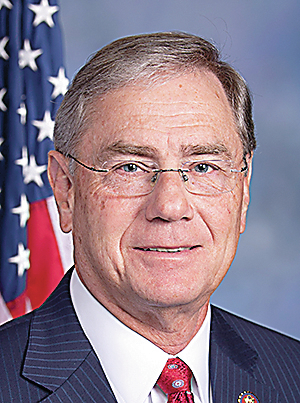There's an old adage that people vote with their pocketbooks.
And inflation has become a sticking point for voters this election cycle as prices have increased faster than they have at any point in the past four decades. The latest Consumer Price Index, released Oct. 13, shows the rate of inflation inching up to 8.2 percent in September.
The candidates for Missouri's 3rd Congressional District have conflicting views on the subject, both in what's causing soaring prices and how to combat it.
Democrat nominee Bethany Mann said inflation is mostly the result of corporate price-gouging and the federal government should be investing in domestic manufacturing, supporting wage increases and forming consumer protections from corporate price hikes to address it.
Republican incumbent Blaine Luetkemeyer, first elected to the U.S. House of Representatives in 2009, maintains that inflation is primarily the result of rampant government spending and that curbing spending, deregulating industries and promoting job growth and wage increases should be solutions.
Luetkemeyer declined an interview request to talk about legislative priorities.
The issue of inflation has come up a lot along the campaign trail, Mann said. The sharp increase in grocery and gas prices is making daily life difficult for many Missourians, she said.
"Thankfully some of the gas prices have gone down a little bit," she said. "But we are living in a time where big corporations, like gas companies, are making record profits and working Americans are paying higher prices."
Mann, a Brentwood mother and agricultural scientist, pointed to the $42 million settlement Smithfield Foods paid in July related to a lawsuit that restaurants and caterers brought forth alleging the meat producer conspired to inflate pork prices. Smithfield previously settled with a different group of pork buyers for $83 million and JBS Foods, another producer, paid $52.5 million to settle a similar beef price-fixing lawsuit, according to the Associated Press.
Pork industry profits have nearly tripled over the past several years, Mann said, but consumers are "still paying premium for a pound of bacon."
"It also means, unfortunately, that we do have to crack down on some of the price-gouging that's happening at some of these big corporations," she said.
Democrats in Congress and the White House have also blamed overzealous profiteering for inflationary price increases.
Republicans have been more quick to blame the Biden administration's $1.9 trillion American Rescue Plan Act, which gave Americans $1,400 checks and funneled hundreds of billions to state and local governments.
Luetkemeyer voted against ARPA and has been a vocal proponent of reducing national spending.
Following the Consumer Price Index report released Oct. 13, Luetkemeyer issued a statement in his role as the ranking member of the House Committee on Small Business.
"Despite the Biden Administration and Congressional Democrats touting their so-called 'Inflation Reduction Act,' inflation continues its rampage on the American economy. The 8.2 percent year-over-year reading and a monthly increase of 0.4 percent is disastrously high and should be a red flag to every American," he said. "It is clear to me and to the American people the Democrats have no plan to address this crisis. Main Street has been plagued with tough economic headwinds for too long. Further incompetent economic policymaking can lead our small business economy into ruin, and it all started with Democrats' inflation."
In addition to corporate price-gouging, Mann said inflation is a result of the COVID-19 pandemic squeezing global supply chains and climate change affecting consumer energy prices.
To address supply chain issues, Mann said the federal government should invest in American manufacturing to decrease reliance on products from other countries and promote better wages for American workers. The CHIPS and Science Act, which President Joe Biden signed into law in August to dedicate $52.7 billion for domestic semiconductor research and manufacturing, is a good start, she said.
"We have to really strengthen our manufacturing sector here at home and that also means we should be investing in the American workforce as well," she said. "So inflation isn't just a problem with prices being too high, it's with wages being too low."
Luetkemeyer, like most House Republicans, voted against the final version of the CHIPS and Science Act.
Climate change is part of the inflation conversation because it is contributing to the rise of energy bills at home, Mann said.
"We've got lots of people around the district who have older air conditioning systems or HVAC systems, and it means they're using a lot of electricity and that electricity is really expensive," she said.
If elected, Mann said she would join on to a bipartisan bill seeking to give federal funds to communities, particularly in rural areas, offering tax credits to residents who update to clean energy systems in their home.
Mann said she doesn't support the Federal Reserve hiking interest rates in an effort to combat inflation because it could "cause more economic problems at some point."
The interest rate hikes, five of which have been made this year alone, make it more difficult for low-income Missourians to borrow money to buy a house or car, she said, and it could scare companies away from borrowing money to make internal investments that keep them competitive with other producers.
Following a small business roundtable hosted by the Jefferson City Area Chamber of Commerce, Luetkemeyer wrote in a constituent newsletter that small businesses were feeling the pain of inflation and "unreasonable government regulation."
Luetkemeyer said the Biden administration has added 131 million new hours of annual paperwork contributing to more than $201 billion in national regulatory costs. Businesses have to pass those costs down to consumers as added product costs or risk going out of business, he added.
"Continued reckless government spending has sent inflation to 40-year highs, which greatly affects small businesses' already slim margins," he wrote in the Oct. 14 newsletter. "On top of inflation, small businesses are facing a significantly trimmed down workforce and labor shortages, supply chain disruptions and government red tape."
Luetkemeyer's plan to address inflation largely rests with the House Republicans' Commitment to America plan.
Luetkemeyer, in an Oct. 6 interview with SiriusXM, said Americans and businesses can spend their money better than the federal government can and the Commitment to America is a plan to empower citizens.
To fight inflation, the plan calls for curbing government spending, increasing worker take-home pay, creating jobs and stabilizing the economy with pro-growth taxes and deregulatory policies.
Luetkemeyer said the federal relief programs have disincentivized people from working, calling Americans younger than 26 years old "the biggest problem group right now."
"The bottom line is that there's a workforce out there that has, over the last two years because of the pandemic, forgotten how to work," Luetkemeyer told SiriusXM. "We've got to get people back to work to get this economy going again."
The general election is Tuesday, Nov. 8. U.S. representatives serve two-year terms with an annual salary of approximately $174,000.



